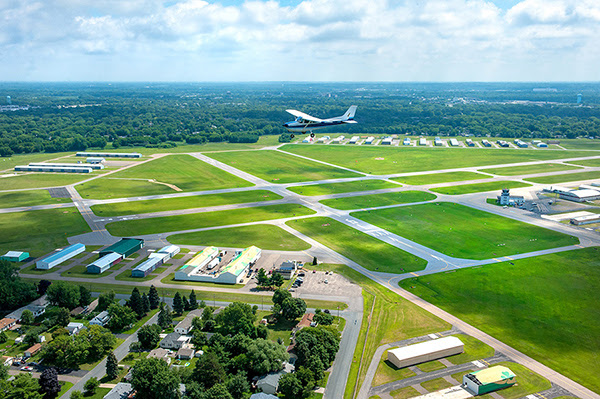The six general aviation airports operated by the Metropolitan Airports Commission (MAC) collectively grew operations in 2020 by 2 percent to total 326,044, or 6,381 more takeoffs and landings than in 2019.
The general aviation airports are often referred to as reliever airports because they relieve congestion that would otherwise occur at the MAC’s major airport, Minneapolis-St. Paul International (MSP).
The increase bucks the trend of U.S. commercial airports which suffered steep declines in activity last year due to the COVID-19 pandemic. MSP reported a 40 percent decline in operations and a 62 percent decline in passengers in 2020.
Flying Cloud Airport (FCM) located in Eden Prairie, MN, and Airlake Airport (LVN) located in Lakeville, MN, drove the operations increase in the MAC reliever airport system. Operations at FCM were up 19 percent, nearly 20,000 operations, over 2019. LVN activity increased by 5 percent over 2019, with nearly 1,500 additional operations in 2020.
Flying Cloud set some new daily operations records in 2020. On May 12, FCM was the 13th busiest airport in the country (commercial or general aviation), and on June 19, FCM marked its eighth busiest day of the past decade with more than 750 flights.
“While the pandemic forced steep declines in corporate travel and business jet activity, it appeared to open up opportunities for more flight training activities and leisure flying in general,” said Joe Harris, director of reliever airports for the MAC. “People had more time to fly. And for many, it was a great way to get outdoors and see the sights from a safe social distance.”
One of the catalysts for the increase in operations at FCM was the temporary closure of many universities. Students enrolled in aviation programs around the United States returned home to the Twin Cities to continue their instruction at one of the many flight schools located at the MAC’s system of reliever airports.
St. Paul Downtown Airport (STP), which serves more corporate flying activity, recording a 26 percent decrease in operations. STP operations were also limited by reduced air traffic tower hours, also due to the pandemic.
The MAC’s three remaining reliever airports – Lake Elmo (21D), Anoka County-Blaine (ANE), and Crystal (MIC) – each saw a less than 5 percent decrease in operations, with ANE down only 1 percent.
| Airport | 2019 | 2020 | Change | % Change |
| 21D | 31,208 | 29,799 | -1,409 | -4.50% |
| ANE | 71,740 | 70,852 | -888 | -1.20% |
| FCM | 104,405 | 124,382 | 19,977 | 19.10% |
| LVN | 29,835 | 31,314 | 1,479 | 5.00% |
| MIC | 41,541 | 39,509 | -2,032 | -4.90% |
| STP | 40,394 | 30,188 | -10,746 | -26.30% |
| Total | 319,663 | 326,044 | 6,381 | 2.00% |
“As the last year demonstrated, there’s a strong demand across our general aviation system. That’s why it’s so important we continue to invest in infrastructure to make the airports as safe and efficient as possible,” said Brian Ryks, CEO of the MAC. “We completed a major runway extension and airfield reconfiguration project at Crystal in 2020, and this year we’ll complete a major phase in a $5 million airfield project at Lake Elmo to extend the runway and a parallel taxiway that will incorporate the latest safety measures to support activities there.”
The Lake Elmo project is less than half of the $11.5 million the MAC has budgeted for capital improvements at its general aviation airports in 2021. Aviation demand is also spurring private investment, with more than a dozen hangars completed or under construction in the last year.
The MAC’s reliever airport system generates an estimated $756 million a year for the area economy and supports more than 3,600 jobs.




